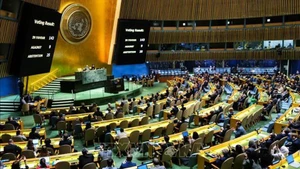Speaking on the last working day of COP15, China's Minister of Ecology and Environment Huang Runqiu announced, that COP 15 adopted the Kunming-Montreal Global Biodiversity Framework.
This agreement is expected to halt and reverse decades of natural destruction that threatens plants, animals and ecosystems around the world, and gather countries on a path to ecosystem restoration.
This is truly a meaningful advancement in humanity's common effort to protect the Earth. After four years of negotiations, more than 190 countries have finally reached a common voice to save the lands, oceans and living species, from the risk of pollution and degradation.
The agreement at COP15 is also considered a “landmark” similar to the Paris Agreement on climate change reached in 2015.
Mobilising finance to protect biodiversity was a tough issue that sparked controversies at COP15. Accordingly, developing countries proposed the launch of a new global biodiversity fund to support and achieve the set goals, such as the establishment of protected areas. This proposal faced opposition from developed countries.
The split between developed and developing countries over the establishment of the biodiversity fund was similar to the debate over financial contributions at the 27th Conference of the Parties to the United Nations Framework Convention on Climate Change (COP27), which took place in November 2022.
Another problem at COP15 was that many countries, mainly in the African region, argued that rich countries have exploited their resources to produce cosmetics and pharmaceuticals, without sharing the benefits with the host communities.
However, despite the concerns regarding COP15, positive signals gradually emerged during this important event. At COP15, Australia, Japan, the Netherlands, Norway, Spain, and the US, made commitments to increase their financial aid to help low-income countries conserve ecosystems.
Previously, France, Germany, Britain, and Canada, pledged before the start of the COP, to increase their funding for biodiversity. This was a positive signal, illustrating the determination of countries to join hands in protecting biodiversity.
The adoption of the Kunming-Montreal Global Biodiversity Framework, on the last days of negotiations at COP15, received international appreciation.
The plan pledges to put 30% of the planet under protection by 2030, and raise international financial flows from developed to developing countries, to at least 30 billion USD per year.
It also includes goals and targets, such as reducing subsidies for agricultural practices that cause environmental degradation, reducing risks from pesticides, and tackling invasive alien species.
Director of the Campaign for Nature Brian O'Donnell emphasised, that the international community has come together for a landmark global biodiversity agreement, that provides some hope that the crisis facing nature is starting to get the attention it deserves.
















